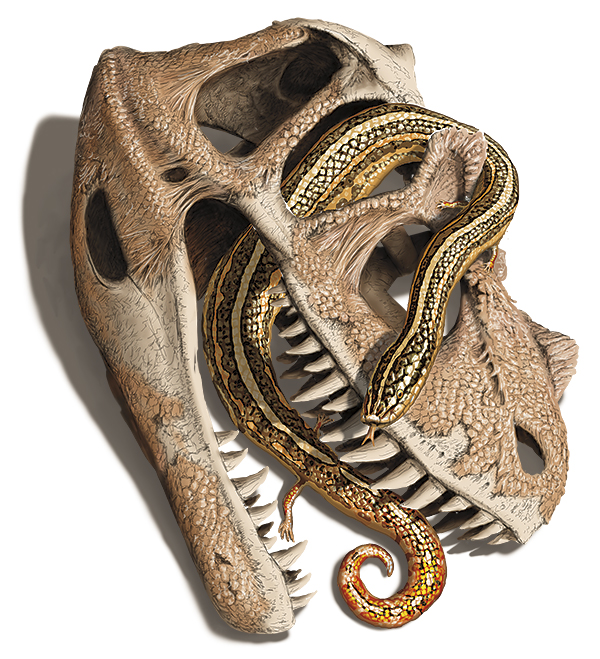
Illustration by Julius Csotonyi
Snakes at least 40 million years older than we thought
We're going to need a lot more candles to celebrate the snake's birthday. We now know that the creatures are much older than scientists previously believed - by 40 to 67 million years - thanks to research published by an international team that included U of A professor Michael Caldwell, '86 BPE, '91 BSc(Hons).
Until now, the oldest known snake fossil dated back 100 million years. This new research, which re-examined fossil material found around the world as long ago as the 1850s - some of these fossils previously misidentified as lizards - proves snakes existed 140 to 167 million years ago. That means snake evolution might be more complex than previously thought.
Popping the Myths of Knuckle Cracking
"Pull my finger," the joke embraced by school-aged kids and embarrassing uncles the world over, is now being used to settle a decades-long debate about what happens when you crack your knuckles.
A team of researchers led by the University of Alberta used MRI video to figure out what happens inside finger joints to cause the distinctive popping sounds. The answer? Bubbles.
"We call it the 'pull my finger study' - and actually pulled on someone's finger and filmed what happens in the MRI. When you do that, you can actually see very clearly what is happening inside the joints," explains lead author Greg Kawchuk, a professor in the Faculty of Rehabilitation Medicine.
MRI video that captured the moment of each knuckle cracking in real time - less than 310 milliseconds - showed the sound is associated with the rapid creation of a gas cavity within the synovial fluid (which lubricates the joints) as the joint separates. "It's a little bit like forming a vacuum," Kawchuk says. "As the joint surfaces suddenly separate, there is no more fluid available to fill the increasing joint volume, so a cavity is created, and that event is what's associated with the sound."
The video also showed a white flash appeared just before cracking, which no one has observed before. Kawchuk would like to use even more advanced MRI technology to understand what happens in the joint after the pop, and what it all means for joint health.
-Bryan Alary

Dwelling on pain could slow recovery
Patients who logged daily pain diaries reported recovery rates that were slower than those who kept no regular record of their symptoms. The study by the Faculty of Medicine & Dentistry examined the effects of such a diary on patients with acute lower back sprains.
At the three-month point in their recovery, only 52 per cent of patients who kept a diary reported recovery, while 79 per cent of patients who did not keep a diary did so.
"It's just more evidence suggesting that how we think about our symptoms affects our symptoms," says Robert Ferrari, '88 BSc(Med), '90 MD, '10 MSc, a clinical professor in the faculty's Department of Medicine and a practising physician. "Symptoms are everything when it comes to the sense of recovery."
-ScienceDaily

Kid chefs make healthier choices
The most effective way to encourage kids to eat and enjoy healthy food could be to get them involved in preparing meals.
Researchers from the School of Public Health surveyed Grade 5 students and found those who helped their parents prepare meals showed an increased preference for fruits and vegetables over junk food. They were also more certain about the importance of healthy food choices.
The overall goal of the research is to decrease the burden of chronic disease on society. Healthy eating does that by promoting bone and muscle development, learning and self-esteem.
-Globe and Mail

Digestive Bacteria in Infants Linked to Allergies
A new study has found that infants with fewer kinds of bacteria in their digestive tracts are more likely to become sensitized to foods such as egg, milk or peanuts.
Infants who developed food intolerances also showed altered levels of specific types of intestinal bacteria called enterobacteriaceae and bacteroidaceae, researchers from the U of A and the University of Manitoba discovered. Their study used bacteria in infant stool samples collected at three months and one year old. They plan to examine the young participants again at ages three and five.
In the hunt for new ways to prevent or treat allergies, the researchers theorize that modifying gut microbiota may be one way to battle allergies.
Transit passes help homeless youths
Homeless youth who were given free transit passes or bus tickets had dramatically fewer encounters with police and better personal safety, according to a recent study led by Miriam Steward from the Faculty of Nursing. The 40 teens involved in the project, called Routes to Homes, were also able to attend school more regularly and search for jobs thanks to their ability to safely manoeuvre around the city.
-Edmonton Journal
Brain Difference Discovered in Stutterers
A new study sheds light on the brain mechanisms underlying stuttering.
A U of A research team used MRIs to examine brain development in children and adults, and determined that the grey matter in a region of the brain responsible for speech, known as Broca's area, develops differently in people who stutter.
The results do not indicate for certain that an atypically developed Broca's region causes stuttering, says research lead Deryk Beal, assistant professor in the Faculty of Rehabilitation Medicine. However the findings support the need for a long-term study of brain development to compare the brain growth of children who stutter with that of those who don't - as well as for that of those who stutter and recover.
"That will help us know how the brains of children who stutter and recover change to achieve fluent speech. We can then start to change our treatments so they affect all kids in this way," says Beal, who is also executive director of the U of A's Institute for Stuttering Treatment and Research, a self-funded centre helping people overcome stuttering since 1985. -bryan alary
We at New Trail welcome your comments. Robust debate and criticism are encouraged, provided it is respectful. We reserve the right to reject comments, images or links that attack ethnicity, nationality, religion, gender or sexual orientation; that include offensive language, threats, spam; are fraudulent or defamatory; infringe on copyright or trademarks; and that just generally aren’t very nice. Discussion is monitored and violation of these guidelines will result in comments being disabled.